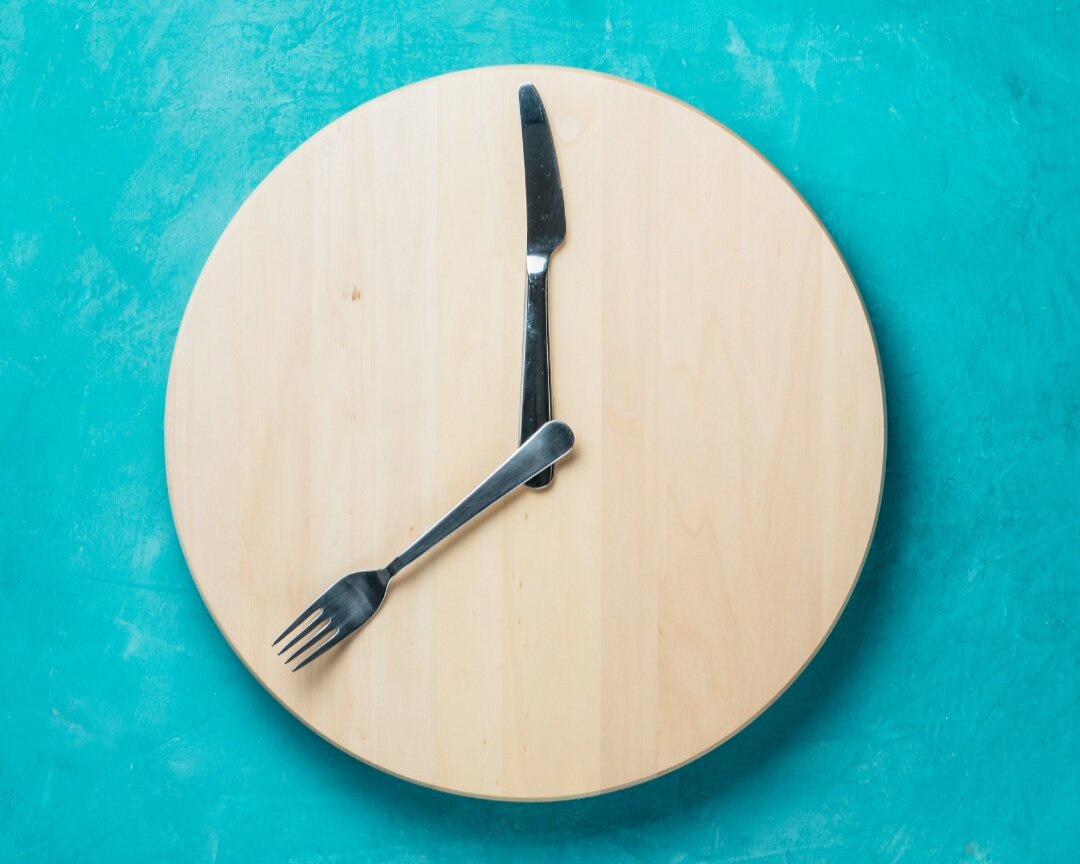Menopause and Intermittent Fasting – Plus 5 Tips for Doing It Right

Intermittent fasting is a way of eating defined by periods of fasting, or not eating, alternating with periods of normal eating. Research shows it can be an effective weight-loss method, especially during menopause. This article covers the basics of intermittent fasting, its potential benefits in midlife, and offers five tips for beginning the intermittent fasting lifestyle.
What is intermittent fasting?
Intermittent fasting has been around in various forms for a long time for medical purposes but recently gained attention as a way to lose weight, especially body fat. This is mainly due to the reduced amount of calories you eat.
This eating pattern promotes weight loss largely because periods of fasting have metabolic impacts. If you don’t break down and use all of the carbohydrates (or sugar) you consume, the extra gets stored in fat cells. When you fast, though, insulin levels decrease, allowing fat cells to release any sugar they’ve been storing so that your body can use it as energy. In this way, intermittent fasting promotes fat burning.
Intermittent fasting differs from the ketogenic diet, which is a low-carbohydrate, high-fat diet. However, some people use keto and intermittent fasting together to promote fat-burning and weight loss.
No calorie counting or macronutrient tracking is involved in intermittent fasting. Additionally, there are no restrictions on foods you can or cannot eat. For many people, intermittent fasting is seen as more of a lifestyle rather than a diet.
Note: Although intermittent fasting does appear to have benefits, especially when it comes to weight loss, it’s still a controversial topic and may not be appropriate for everyone. This approach to eating is not recommended for menopausal women who have a history of disordered eating, who are underweight, or who have chronic medical conditions such as diabetes or heart disease. More research is needed on humans to determine the best applications for this dietary pattern.
How can I intermittent fast?
There are several approaches to intermittent fasting, but the most common methods include either fasting for 24 hours twice per week or fasting on alternate days for 16 hours per day.
Every woman has individual needs and differences when it comes to the best way to eat, and intermittent fasting is no different.
Regardless of what fasting schedule you choose, it’s important to keep an emphasis on healthy, whole foods. As you can imagine, eating a large amount of processed foods won’t be very helpful in the weight loss or overall health department. The best results come from choosing the best foods, too!

Some of the most popular fasting schedules and approaches to intermittent fasting for women include:
- The 5:2 Diet: For two days per week, lower your caloric intake to around 25% of your usual intake. Based on a 2,000 calorie diet, this would be around 500 calories. On the remaining five weekdays, eat normally. There should be one day scheduled between fasting days.
- 24-Hour Protocol: This involves a 24-hour fast on one or two days per week. Some people recommend starting with 14-16 hour fasts to get your body used to fasting.
- Crescendo Method: On two or three days per week, this method involves fasting for 12-16 hours. This is best spread out during the week, like on Monday, Wednesday, and Friday.
- Modified Alternate Day Fasting: This method allows you to eat normally every other day. On fasting days between normal eating days, you’ll eat 20-25% of your normal calorie intake.
- The Leangains Method: All calories are eaten in an eight-hour window using this method, leaving the other 16 hours for fasting each day. You can start with shorter fasting periods, like 14 hours, to start. Many health professional don’t recommend shortening your eating window to less than eight hours, as this can actually promote the formation of gallstones in women.
How can intermittent fasting help with menopause weight gain?
Intermittent fasting reduces the overall number of calories you eat. Having a calorie deficit is necessary for weight loss to result. This can be beneficial during menopause because this is a time when many women gain unwanted weight, due to hormone changes, aging, poor sleep, and other factors.
A 2017 study showed that when people ate only during a four-hour window, their energy intake was reduced by around 650 calories.
Another study found that when healthy men and women fasted for 36 hours, their overall caloric intake was decreased by 1,900 calories, despite eating more in the period following their fast.
Research also shows that for postmenopausal women specifically, intermittent fasting can be useful for weight loss and weight control.
What are the other benefits of intermittent fasting?
In addition to supporting weight loss, intermittent fasting also has the potential to reduce your risk for various conditions like heart disease and diabetes. It may also help prevent muscle loss and improve mental health.

Studies have shown the ability of intermittent fasting to lower blood pressure, triglycerides, and improve insulin sensitivity in some people. It may also reduce inflammation, a state which can lead to weight gain and chronic conditions if left untreated.
These are all especially useful benefits during menopause, as this is a season of life characterized by abdominal weight gain (what we call the “meno 10”), an increased risk for heart disease, a natural loss of muscle mass, and a higher risk for depression and other mood disorders.
Interestingly, animal studies suggest that intermittent fasting may even increase life expectancy. However, this hasn’t been studied in humans.
What should women be aware of if they are interested in fasting?
Some research shows that intermittent fasting may be more beneficial for men than for women. Again, we’re all built and wired differently.
For example, a 2005 study found that intermittent fasting resulted in worsened blood sugar control for women but not for men.
Additionally, women seem to be much more sensitive to caloric restriction than men. Some animal studies suggest that fasting can actually disrupt certain reproductive hormones.
For the best results and lowest risks, shorter and less frequent periods of fasting may be a better approach to intermittent fasting for women.
If you’re uncertain if intermittent fasting is right for you or the best approach for your lifestyle, it may be a good idea to speak to a registered dietitian or physician who is knowledgeable in this area. You can search for a local dietitian using this link, filtering for professionals who specialize in women’s health and weight loss.
5 tips for intermittent fasting:
To sum things up, here are five tips to consider if you’re interested in trying intermittent fasting during menopause.
- Start slowly, with shorter fasting periods, and gradually work your way up to the length of fasting that you’re comfortable with.
- Don’t over-restrict your caloric intake, as this can also be detrimental. If you don’t consume enough energy, your body can eventually hang on to extra calories, negating weight loss or health benefits.
- Take this opportunity to find a new hobby or other way to enjoy your time. Fasting when you’re not used to going longer periods without eating can be difficult, especially if you’re prone to snack when bored. Stay busy, find new activities, and be mindful of how you feel.
- Drink plenty of water and stay hydrated. And yes, you can still drink unsweetened coffee and tea during a fast. Coffee may actually help keep hunger at bay.
- Seek professional guidance to determine the best nutrition plan for your goals. Intermittent fasting is not a one-size-fits-all dietary approach and may not be appropriate for every woman.
For more expert guidance on menopause and healthy aging, download Midday from the App Store or visit us at Midday.Health.
Lauren Panoff, MPH, RD, is a registered dietitian, freelance writer, and speaker who helps families transition to plant-based lifestyles. She can be found at laurenpanoff.com or on Instagram @chronicplanet.
Sign up for more unique women’s health content
By submitting this form, you agree to the Lisa Health Privacy Policy and Terms of Use


